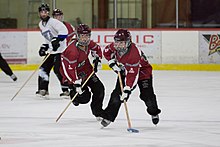
Hockey is a term used to denote a family of various types of both summer and winter team sports which originated on either an outdoor field, sheet of ice, or dry floor such as in a gymnasium. While these sports vary in specific rules, numbers of players, apparel, and playing surface, they share broad characteristics of two opposing teams using sticks to propel a ball or disk into a goal.
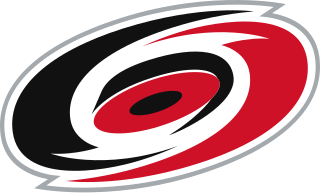
The Carolina Hurricanes are a professional ice hockey team based in Raleigh, North Carolina. The Hurricanes compete in the National Hockey League (NHL) as part of the Metropolitan Division in the Eastern Conference. The team plays its home games at Lenovo Center.

The Hartford Whalers were a professional ice hockey team based for most of its 25-year existence in Hartford, Connecticut. The club played in the World Hockey Association (WHA) from 1972 until 1979, and in the National Hockey League (NHL) from 1979 to 1997.

A third jersey, alternative jersey, third kit, third sweater or alternative uniform is a team jersey or uniform that a sports team can wear instead of its home outfit or its away outfit during games, often when the colors of two competing teams' other uniforms are too similar to contrast easily.

A goaltender mask, commonly referred to as a goalie mask, is a mask worn by goaltenders in a variety of sports to protect the head and face from injury from the ball or puck, as they constantly face incoming shots on goal. Some sports requiring their use include ice hockey, lacrosse, inline hockey, field hockey, rink hockey, ringette, bandy, rinkball, broomball, and floorball. This article deals chiefly with the goal masks used in ice hockey.
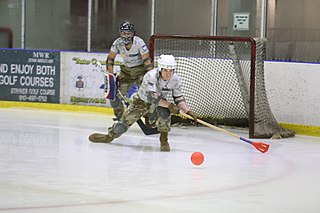
Broomball is a both a recreational and organized competitive winter team sport played on ice or snow and is played either indoors or outdoors, depending on climate and location. It is a ball sport and is most popularly played in Canada and the United States.

Sports equipment, also called sporting goods, are the tools, materials, apparel, and gear, which varies in shapes, size, and usage in a particular sport. It includes balls, nets, rackets, protective gears like helmets, goggles, etc. Since the performer must use a sport equipment, it can also be serve for protection.
The 1979–80 NHL season was the 63rd season of the National Hockey League. This season saw the addition of four teams from the disbanded World Hockey Association as expansion franchises. The Edmonton Oilers, Winnipeg Jets, New England Whalers, and Quebec Nordiques joined the NHL, bringing the total to 21 teams. The other two WHA teams were paid to fold.

In ice hockey, the goaltender wears specialized goaltending equipment to protect themselves from the impact of the puck, and to assist in making saves. Ringette and rinkball goaltenders use the same equipment with some exceptions. This article deals chiefly with the sport of ice hockey.

Mark Steven Howe is an American former professional ice hockey defenseman and left winger who played sixteen seasons in the National Hockey League (NHL) following six seasons in the World Hockey Association (WHA).

Baseball stirrups, also called stirrup socks or simply stirrups, are socks that are part of a traditional baseball uniform, giving the uniform a distinctive look. Stirrup socks are usually one of a team's traditional colors, and are worn over long socks that are usually white in color. The stirrup sock lacks toe and heel sections, instead having a loop which fits within the arch of the foot. Over the years, the stirrup loop tended to get longer, exposing more of the white undersock, thus creating a look unique to baseball. Most contemporary players in Major League Baseball (MLB) do not wear stirrup socks, as uniform pants that extend all the way down to the ankle have become increasingly popular since the mid-1990s.
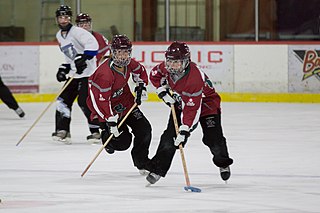
Ringette is a non-contact winter team sport played on an ice rink using ice hockey skates, straight sticks with drag-tips, and a blue, rubber, pneumatic ring designed for use on ice surfaces. While the sport was originally created exclusively for female competitors, it has expanded to now include participants of all gender identities. Although ringette looks ice hockey-like and is played on ice hockey rinks, the sport has its own lines and markings, and its offensive and defensive play bear a closer resemblance to lacrosse or basketball.

In ice hockey, players use specialized equipment both to facilitate the play of the game and for protection as this is a sport where injuries are common, therefore, all players are encouraged to protect their bodies from bruises and severe fractures.
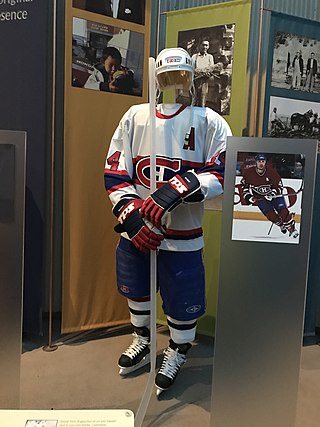
Players in the National Hockey League wear equipment which allows their team affiliation to be easily identified, unifying the image of the team. An NHL uniform consists of a hockey jersey, hockey pants, socks, gloves, and a helmet.

The goalie blocker is a rectangular piece of equipment worn by goaltenders in the sports of ice hockey, roller hockey, rink hockey, broomball, and ringette. It is generally worn on the dominant hand. This article deals chiefly with blockers worn by goalies who play winter sports.

Cooper Canada Ltd. was a sporting goods and fine leather goods manufacturer based in Toronto, Ontario, Canada. In its heyday, the 1960s through to the 1980s, the company was Canada's leading producer of fine leathergoods, hockey, baseball and lacrosse equipment. The company pioneered team-coloured hockey equipment and the use of nylon, foam, and modern plastics in equipment manufacturing.

Pads are a type of protective equipment used in a number of sports and serve to protect the legs from the impact of a hard ball, puck, or other object of play travelling at high speed which could otherwise cause injuries to the lower legs. These are used by batters in the sport of cricket, catchers in the sports of baseball and fastpitch softball, and by goaltenders in sports such as ice hockey, ringette, bandy, rinkball, field hockey, rink hockey and box lacrosse.
The tuck rule is a rule by the National Hockey League (NHL) that stipulates how jerseys must be worn over protective equipment. Notable players who have previously tucked in their jerseys include Alexander Ovechkin, Evgeni Malkin, Patrice Bergeron, Kris Letang, Pavel Datsyuk, Wayne Gretzky and Jaromir Jagr. However, the rule has not been strictly enforced since its introduction to the NHL, as some players, such as Connor McDavid, Evgeni Malkin and Wayne Simmonds have been seen with a slight tuck in their jersey. Detroit Red Wings winger Daniel Sprong continues to tuck his jersey during play.
The 2018–19 NHL season was the 102nd season of operation of the National Hockey League. 31 teams competed in an 82-game regular season. The regular season began on October 3, 2018, and ended on April 6, 2019. The 2019 Stanley Cup playoffs began on April 10, 2019, and the Stanley Cup Finals concluded on June 12, 2019, with the St. Louis Blues winning their first Stanley Cup in the Finals over the Boston Bruins in seven games.

